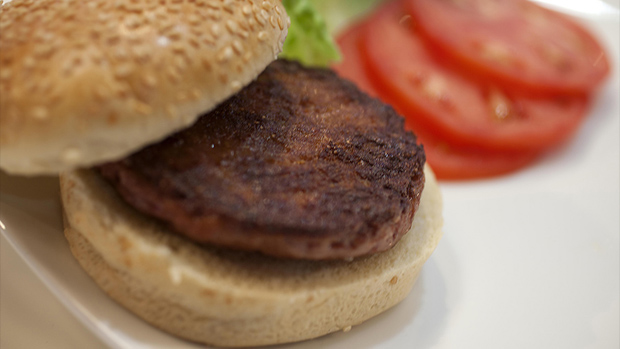What does a lab-grown burger taste like? Not that juicy
Google billionaire Sergey Brin revealed as financier behind experiment to 'grow' beef from cells

A free daily email with the biggest news stories of the day – and the best features from TheWeek.com
You are now subscribed
Your newsletter sign-up was successful
GOOGLE billionaire Sergey Brin has been revealed as the mystery businessman who paid for the creation of the world's first "test-tube" burger, tasted in London today.
The Google co-founder, worth an estimated $20bn, told The Guardian he was moved to invest in the technology for animal welfare reasons and believes it has "the capability to transform how we view the world".
Brin has a history of investing in outlandish projects, from driverless cars to trips to the moon.
The Week
Escape your echo chamber. Get the facts behind the news, plus analysis from multiple perspectives.

Sign up for The Week's Free Newsletters
From our morning news briefing to a weekly Good News Newsletter, get the best of The Week delivered directly to your inbox.
From our morning news briefing to a weekly Good News Newsletter, get the best of The Week delivered directly to your inbox.
The burger – which was served up to volunteers in Hammersmith, west London this afternoon – was made from laboratory-developed "cultured beef" and cost around £250,000 to produce. The revolutionary patty was made by a team at the University of Maastricht in the Netherlands using muscle cells from a cow. They turned the cells into 20,000 tiny strips of meat which they used to create the burger.
Among the tasters was Chicago-based food writer Josh Schonwald and an Austrian food trends researcher Hanni Rützler, reports the BBC.
"I was expecting the texture to be more soft," said Rützler "There is quite some intense taste; it's close to meat, but it's not that juicy. The consistency is perfect, but I miss salt and pepper."
She added: "This is meat to me. It's not falling apart."
A free daily email with the biggest news stories of the day – and the best features from TheWeek.com
Schonwald said: "The mouthfeel is like meat. I miss the fat, there's a leanness to it, but the general bite feels like a hamburger. What was consistently different was flavour."
Animal welfare organisation Peta (People for the Ethical Treatment of Animals) welcomed the research, saying it spelled the end of "lorries full of cows and chickens, abattoirs and factory farming". It added that the technology could "reduce carbon emissions, conserve water and make the food supply safer".
It's the "start of a brave moo world", says The Independent. However it adds: "The raw ingredients sound distinctly unappetising - 0.02in (0.5mm) thick strips of pinkish yellow lab-grown tissue."
Nevertheless, the research team believes the artificial meat products could appear in supermarkets in as little as ten years' time.
Early indications suggest that cultured meat could reduce the need for land and water on the planet by as much as 90 per cent and overall energy use by up to 70 per cent, according to The Guardian. "If successful, lab-grown meat could become a viable way to tackle the increasing environmental impact of meat consumption around the world."
-
 Political cartoons for February 15
Political cartoons for February 15Cartoons Sunday's political cartoons include political ventriloquism, Europe in the middle, and more
-
 The broken water companies failing England and Wales
The broken water companies failing England and WalesExplainer With rising bills, deteriorating river health and a lack of investment, regulators face an uphill battle to stabilise the industry
-
 A thrilling foodie city in northern Japan
A thrilling foodie city in northern JapanThe Week Recommends The food scene here is ‘unspoilt’ and ‘fun’